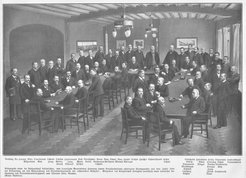Call for Papers: Authors’ workshop - Administory. Journal for the History of Public Administration
Which normative standards are able to guide administrative action? Irrespective of the era or administrative culture under analysis, it should be clear that administration is not merely a dispassionate enforcer of legal norms or an executor of political programmes. Rather, administrations operate within a network of different normativities. Neither a law-like, differentiated programme of norms nor a binding force that derives its strength from judicial enforceability or from the authority of higher political instances are necessary features thereof; it can be the case that normativities only are diffuse and informal; sometimes they first become visible when conflicts over norms erupt.

Contributions mapping out this landscape are now being collected for the special issue of Administory: 'Administrative Multinormativity', edited by Peter Becker (Vienna) and Peter Collin (Frankfurt am Main). Case studies involving 19th- and 20th-century administration should show how cooperation and conflict between different normativities were carried out, how new normative arrangements emerged, and how normative conflicts were made manageable.
First versions of the texts will be discussed at an author workshop to be held on 27-28 September 2019 at the Max Planck Institute for European Legal History, Frankfurt am Main; travel and accommodation costs will be covered. We invite historians, jurists, sociologists and cultural and political scientists to submit contributions (in German or English). Proposals (maximum 500 words) should be submitted to collin@rg.mpg.de or peter.becker@univie.ac.at by 15 May 2019.
Image: Tübingen municipal councillors, members of the citizens' committee and leading civil servants (photomontage 1909).
Source: Tübinger Gemeindeverwaltung in den letzen 50 Jahren, Tübingen 1927
